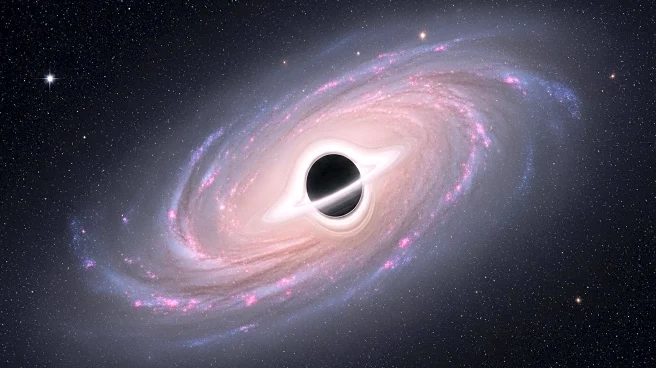What's Happening?
Astronomers have identified the smallest dark object ever discovered in the universe using a global network of telescopes. This object, which does not emit light or detectable radiation, was found through its gravitational influence on light, a phenomenon known as gravitational lensing. The discovery, detailed in studies published in Nature Astronomy and the Monthly Notices of the Royal Astronomical Society, suggests the object could be a dense clump of dark matter or an inactive dwarf galaxy. Weighing about a million times as much as the Sun, this object challenges existing theories about dark matter, which is believed to constitute roughly one-quarter of the universe. The research involved data from the Green Bank Telescope in West Virginia, the Very Long Baseline Array in Hawai'i, and the European Very Long Baseline Interferometric Network.
Why It's Important?
This discovery is significant as it could reshape current understanding of dark matter, a mysterious substance that influences the arrangement of galaxies and stars. Identifying such low-mass objects is crucial for testing theories about dark matter's nature and distribution. The findings support the 'cold dark matter theory,' which underpins much of the current understanding of galaxy formation. If more such objects are found, it could validate or challenge existing models, impacting future astronomical research and theories about the universe's composition.
What's Next?
Researchers are continuing to analyze data to better understand the nature of the discovered object and are searching for similar objects in other parts of the sky. The goal is to determine whether the number of such objects aligns with theoretical models. This ongoing research could lead to further discoveries that refine or redefine dark matter theories, influencing future studies in cosmology and astrophysics.
Beyond the Headlines
The discovery raises questions about the ethical and philosophical implications of understanding the universe's fundamental components. As scientists uncover more about dark matter, it could lead to technological advancements and a deeper comprehension of the universe's origins and structure, potentially influencing cultural and scientific perspectives on existence.









